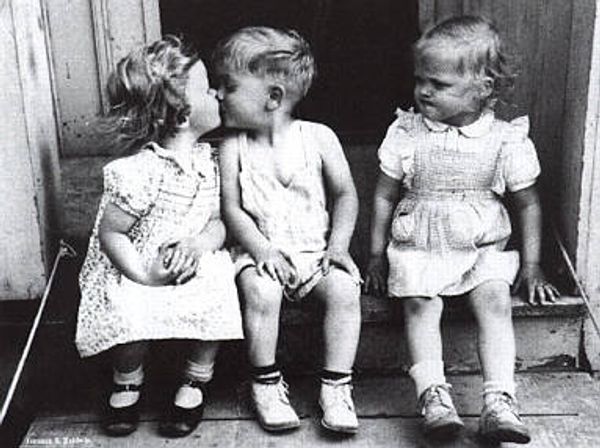“Everything we hear is an opinion, not a fact. Everything we see is perspective, not the truth.” —Marcus Aurelius
Essentially, all our modern-day qualms boils down to this: do we, or do we not, agree with Marcus Aurelius?
Some people will.
"Of course," they'll say. "Truth is based entirely on perspective. If everyone grew up in a society where cannibalism was perfectly moral and widely accepted, if not encouraged, it's only natural that people who were raised in such a manner are perfectly fine with cannibalism."
Some examples of where this occurred are the islands of Fiji, New Zealand (pre-colonization), the Amazon Basin and the Congo.
These people are the people who, despite being repulsed by the idea of cannibalism, acknowledge that while it is not something that they will not personally do, let it carry on. They acknowledge that there are many sets of morals, and realize that what is not moral to some may be moral to others.
Some people will not.
"Just because some people believe that cannibalism is perfectly moral does not make it moral. They're just mistaken, and uneducated in the moral ways of proper people," they'll counter. And usually these are the people who will cite a deity, like God, Allah or Brahman.
These are the people who will try and stop the cannibalistic rituals, citing immorality as a reason. They will not acknowledge that what is morally incorrect to them may not be morally incorrect to others — not out of harm, but rather, quite the opposite. They want everyone to be good, and live moral lives, so they will enforce their morals — which are, in their eyes, the only set of morals, onto other people.
So what's the correct answer? To agree or to disagree?
I'm not going to say that there is no right answer, because there is a right answer. But that right answer is also entirely dependent on your upbringing and your religion. Do you believe that everyone can follow their own sets of relative truths, and that nobody is wrong but just different? Or do you believe that there is only one set of truth, and that everyone who does not believe in that truth would be uneducated in the ways of righteousness and by extension, wrong?
It doesn't really matter what you believe, personally. But what does matter is the fact there are two types of vastly differing beliefs regarding morals, which are, in a sense, truths. Relative truths and absolute truths, two conflicting ideas, cannot coexist in one world.
Laws are made to uphold morality. That's why some things which are widely considered immoral, such as murder, are made illegal. It's also immoral to rape, steal from or assault another human being. Those things have been made into laws as well.
But what happens when the government attempts to make a law, and by extension, uphold morality, in subject matters in which people do not agree on what's moral and what's not?
SEE ALSO: 3 Types Of People In Our Society, As Seen Through The Characters Of Zootopia
Abortion rights, most famously, perfectly illustrate this. Abortion rights are a matter of one’s idea of morality, made into a law. In this particular debate, there are two sides — pro life and pro choice. Pro-life’s main problem with abortion is the fact that abortion, which results in the death of a fetus, is immoral. They believe a fetus is human, and they believe that abortion is essentially murder. On the flip side, one of pro-choice’s main points, besides practicality, is that they believe that fetuses are not yet human until they can feel, and as all abortions are performed before the development of nerves, having an abortion is the equivalent of removing a cluster of cells.
In fact, I can even go far enough to generalize that Republicans, who are generally conservative, believe in absolute truth, while Democrats believe in relative truth. Thus contributes to factionalism, our current problem.
The problem is, where morals are concerned, everyone believes that they're right and justified. Even more problematic is the fact that they are.
So how do we find out whether there’s an absolute truth, or truth is relative?
In a nutshell? We can't. Unless we can prove the existence of God or other deities with something more solid than verbal or written testimonials, people who believe in relative truths will continue on believing that as there is no supreme deity and that everyone's sense of truth is relative. People with faith will continue believing in a supreme deity, and following the morals of said deities.
As perfectly stated in the following quote, summing up the conundrum we’re experiencing:
“An indivisible existence can’t be proven if it’s been there forever.” — Anonymous
The fact that we cannot prove the superiority of either absolute truth or relative truth is the main culprit behind America's factionalism. As seen, differing or lack of religions is what gives everyone a different sense of truth, and the un-provability of it all is what makes this all so valid.
My dad once complained about America's diversity, saying that it was America's vast differences that gave it all its problems. "If only people were more similar in their culture and their beliefs, we wouldn't have this problem," he'd say, referring to something on the daily news. "I wish America wasn't so diverse."
The thing is, it is this diversity, this variety, that makes America great. People have lots of ideas, and here, they can patent and market them. It's why we have so much commercial success. However, conflicts arise when there is no real answer to something as solid and intangible as morality. While we could go the oppressive route and ban religious freedom, freedom of speech and some other freedoms in an effort to make America as assimilated as we possibly can,eradicating differing moral beliefs such as these, there is no doubt that doing so will result in an undeniable loss of identity and humanity.
Not too long ago, my friend Margaret Xiao stated, "Factionalism is tearing America apart. Americans as a whole need to address this problem, but the question is, how?"
My answer? We can't.



















